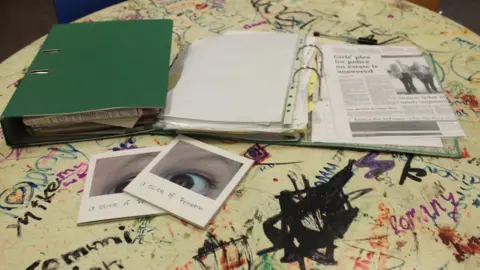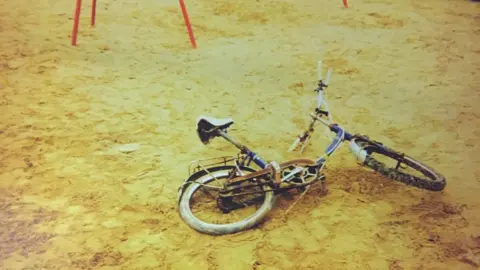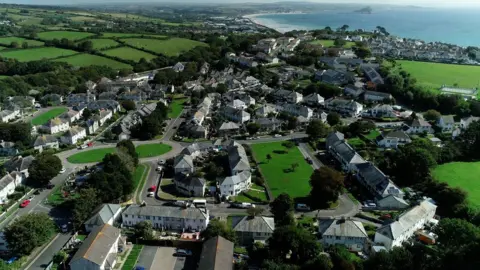Trelya charity was the 'family I chose'
 Trelya
TrelyaA young mum has said she cannot imagine life without the youth charity that has supported her since primary school and her children since they were born.
Trelya - which means change in Cornish - has been working with children from disadvantaged backgrounds in west Cornwall since 2001.
The Penzance-based charity runs an intensive mentoring project and has recently started a nursery.
Tegan - not her real name - is one of hundreds of young people it has helped.
She said the charity and its workers were the "family I chose to go into".
"I had not a very nice childhood at some points... going to Trelya was normality for me," she said.
"Trelya was there when I needed that advice or I needed help with something. I never thought 'oh I am struggling, I will go to my [family]'.
"I always thought 'oh I need something, I will go to Trelya'."

Trelya is based on the Treneere estate, around a mile away from Penzance's town centre with its art galleries, holiday lets and restaurants.
The estate is one of the most deprived areas in England, according to figures from the Index of Multiple Deprivation 2019.
Trelya executive director Sharon Rich said people there faced challenges, not unique to Treneere or even Cornwall, but including low income, addiction, domestic violence, poverty and poor mental health.
For Tegan, Trelya meant an escape from home life and she said if the charity was not there she "probably wouldn't be who I am now because I was so caught up in negative things".
"I have come and gone from Trelya loads of times. It is not a timescale, there is never anything where they have said 'we can't do that' or 'you are too old now'.
"They have always been there and open and that is kind of what a family is."
 Trelya
TrelyaDirector of services Cat Keene said Trelya started out offering detached youth work - walking the streets of Treneere and getting to know young people like Tegan.
She said: "We realised that, although we were providing really positive experiences and opportunities for a huge amount of young people, that still outside of those experiences, life was still the same.
"There was still the same risk-taking behaviour, the same spiralling into chaos that can so quickly happen... [so] it wasn't enough.
"I think for us as an organisation we became really passionate about delivering an intervention that was the catalyst for a fundamental step change so generationally the same patterns weren't being repeated."
This led Trelya to become the first and only international affiliate of American charity, Friends of the Children, running an intensive mentoring project, pairing a young person with a dedicated professional mentor who works with them every week for over a decade.
But Ms Keene said that still was not enough and 18 months ago Trelya launched an Ofsted-registered nursery after the young people it first started working with began to have their own children.
Skylar, which has just celebrated its first children moving on to school, is for children as young as three months old.

Nursery graduates would then get a place on the mentoring programme and be supported until they finished further education.
Ms Keene said: "There is a huge amount of research available to all of us that highlights the critical importance of quality early intervention."
She said the programmes were having "real successes" and added: "We will be with those children until adolescence and beyond or until they don't need us anymore."
Tegan said the charity had been "like another parent" to her children.
"I couldn't imagine scenarios in my head and imagine Trelya not being there," she said.
"I wouldn't want to imagine life without them, not at all."
Another mother, whose children attended the charity, added: "For a child I should imagine it is like having a blanket because they are just security and stability which some of the children on the estate probably don't have."
